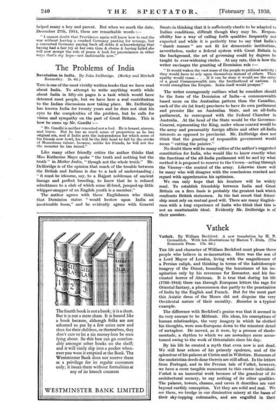The Problems of India
Revolution in India. By John Dellbridge. (Morley and Mitchell Kennerley 2s. 6d.)
Tins is one of the most vividly written books that we have read about India. To attempt to write anything worth while about India in fifty-six pages is a task which would have deterred most people, but we have here a real contribution to the Indian discussions now taking place. Mr. Dellbridge has known India for twenty years and he does not shut his eyes to the complexities of the problem, but he calls for vision and sympathy on- the- part of Great Britain. This is how he sums up Mr. Gandhi :—
" Mr. Gandhi is neither conceited nor a fool. He is honest, sincere, and brave. But he has as much sense of proportion as he has original sin, and if India gets the independence for which some of his friends now howl, his will be the first head to fall by the stroke of Mussulman tulwar, because, unlike his friends, he will not flee the monster he has raised."
Like many other friendly critics the author thinks that Miss Katherine Mayo spoke " the truth and nothing but the truth " in Mother India, " though not the whole truth." Mr. Dellbridge is of the opinion that much of the trouble between the British and Indians is due to a lack of understanding ; " it must be irksome, say, to a Rajput nobleman of ancient lineage and perfect breeding, to know that he is refused admittance to a club of which some ill-bred, jumped-up little whipper-snapper of an English youth is a member."
The author agrees with those Englishmen who think that Dominion status " would bestow upon India an inestimable boon," and he evidently agrees with General
Smuts in thinking that it is sufficiently elastic to be adapted to Indian conditions, difficult though they may be. Respon- sibility has a way of calling forth qualities frequently not expected and while it is perfectly true to say that India's " dumb masses " are not fit for democratic institutions,
nevertheless, under a federal system with Great Britain in
the background, the art of governing could by degrees be• taught to ever-widening circles. At any rate, this is how the
writer envisages the granting of Dominion rule :-
" It would waken the vast mass of the people to political activity ; they would have to rely upon themselves instead of others. Their apathy would cease. . . . If it can be done it would see the entry of a great Commonwealth into the brotherhood of nations. It would strengthen the Empire. India itself would prosper."
The writer courageously outlines what he considers should be the form of the Dominion of India—a commonwealth based more on the Australian pattern than the Canadian, each of the six (at least) provinces to have its own parliament and premier like an Australian State, and an all-India parliament, to correspond with the' Federal Chamber in Australia. At the head of the State would be the Governor-
General,, representing the King, under whose control would be the army and presumably foreign affairs and other all-India
interests as opposed to provincial. Mr. Dellbridge does 'not think that the granting of responsible government Would mean " cutting the painter."
No doubt there will be many critics of the author's suggested constitution for India, who would like to know exactly what the functions of the all-India parliament will be and by what method it is proposed to reserve to the Crown—acting through the Viceroy—the control of the army. Likewise there will be many who will disagree with the conclusions reached and regard with apprehension his optimism. • We can only hope that his brochure will be widely read. To establish friendship between India and Great Britain on a firm basis is probably the greatest task which confronts British statesmen. In the last resort that friend- ship must rely on mutual good will. There are many English- men with a long experience of India who think that this is not an unattainable ideal. Evidently Mr. Dellbridge is of their number.










































 Previous page
Previous page